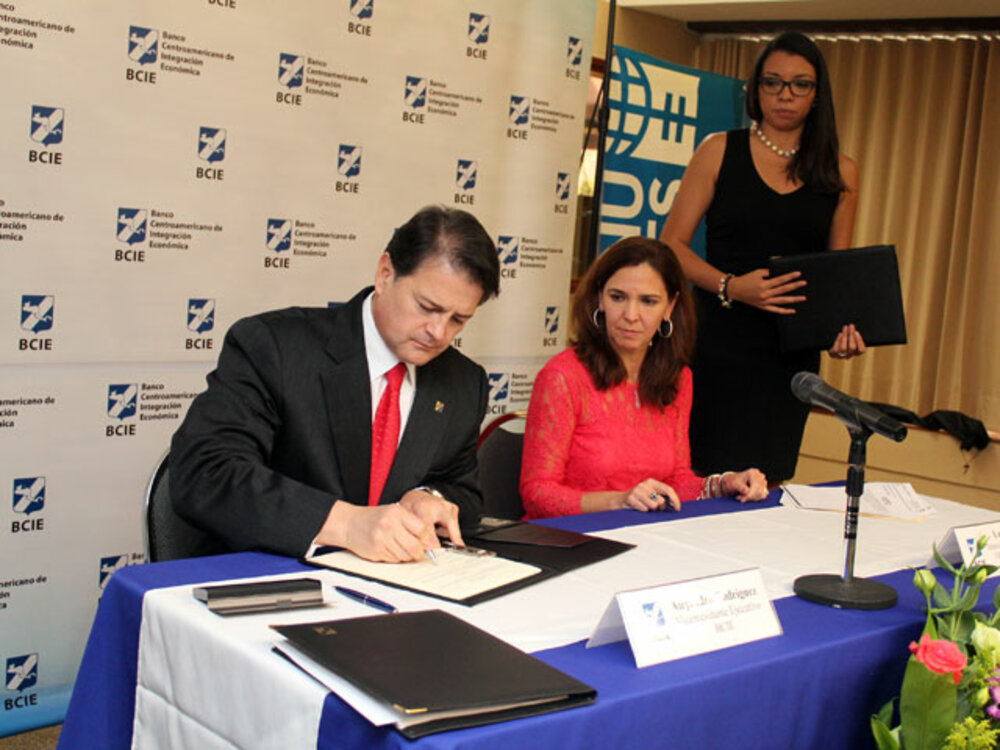CABEI and UN Women reaffirm commitment to gender equality in the region

CABEI will continue to promote the active inclusion of women in societies through the generation of differentiated programs, projects and instruments focused on gender equality in order to meet the changing and particular needs of women, with special emphasis on more vulnerable women.
Tegucigalpa, December 08, 2016. - Today, the Central American Bank for Economic Integration (CABEI), which implements initiatives to address suchissues as gender equality, social inclusion, development and economic integration, signed the third version of a Gender Equality Memorandum of Understanding with the United Nations Entity for Gender Equality and the Empowerment of Women (UN Women).
The instrument establishes the framework for cooperation and collaboration between the parties and aims to continue to make progress on issues related to the promotion of women's economic rights, especially through the implementation of projects and programs that foster gender equality and the empowerment of women.
At the signing ceremony, CABEI Executive Vice President, Attorney Alejandro Rodríguez, stated that, “The relationship between the two institutions has created a space for reflection that contributes to the search for initiatives which enable the effective implementation of the Bank's Gender Equality Policy.” In addition, he added that, “CABEI recognizes the importance of women as a harmonizing tool for social inclusion, development, economic integration and long-term environmental sustainability. In their role as entrepreneurs and as the basis of the social and household structure, women constitute a channel for ensuring that the impacts of development operations have a spillover effect at the base of the economic pyramid.”
Furthermore, Attorney Rodriguez commented that CABEI is committed to continue to promote gender equality in order to boost economic growth, reduce poverty and expand markets, which are fundamental principles of economic integration. To that end, he proposed that the Bank continue to demonstrate leadership through more streamlined event coordination, signing of agreements and granting of non-reimbursable cooperation in order to promote increased economic development through the different interventions carried out by the Institution.
It is estimated that CABEI operations approved during the 2010-2015 period for the Social Development Axis benefitted more than 4.4 million women and 2.8 million girls and/or female students through initiatives in the areas of healthcare and education. It has also benefited more than 240,000 women through financial intermediation programs, including the Regional Financing Program for Women Entrepreneurs (FEM), which is a gender-based product designed to promote women’s empowerment and economic autonomy.
For her part, UN Women Deputy Regional Director for Latin America and the Caribbean, Mrs. Lara Blanco said that, “Promoting women's economic empowerment is one of the strategic goals that UN Women has established in order to reach a 50/50 planet by 2030, which is in line with the Sustainable Development Objectives.”
Mrs. Blanco also emphasized that, “All key economic and political stakeholders in the world stress the importance of recognizing women as fundamental economic actors. Their role and status as citizens, consumers, entrepreneurs, leaders and employees is an indicator of economic wellbeing, maturity and viability. Promoting access to fair credit; increasing the number of women who own land and that are in decision-making positions; reducing the wage gap between men and women; promoting women entering the labor market; and fostering measures to balance personal and work life are some examples of the mechanisms executed with the aim of achieving women’s economic autonomy and empowerment.”





